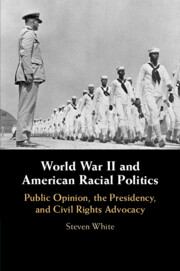'Steven White’s remarkable book enriches our scholarly understanding of the relationship between World War II and black civil rights advocacy. White acknowledges the compelling narrative that black activists were able to advance in light of their service, the ways that the executive branch both supported and resisted these narratives, and how white racial attitudes shifted during this period. This book encourages us to see the World War II era as an important but incomplete step toward civil rights, and helps to show the strengths and limitations of arguments for rights based on service.'
Julie Novkov - University at Albany, State University of New York
'Unique among scholars working on this issue, the author is able to draw expertly on both public opinion surveys and archival materials to complicate our understanding of the impact of war on the fight for racial equality. When he concludes that the effects of war ‘can be uneven and often surprising, its consequences both compelling and constraining’, we should believe him. An impressive book.'
Robert Mickey - University of Michigan
'Total war forces a flawed democracy to live into its ideals - or does it? Carefully interrogating the canonical case of the color line during World War II America, Steven White complicates conventional wisdom with fresh evidence and clear thinking.'
Rick Valelly - Swarthmore College, Pennsylvania
‘This book offers a fresh approach to difficult aspects of World War II's legacy in the US.'
J. P. Sanson
Source: Choice
‘Steven White challenges an axiom of American historical memory: that World War II helped push white Americans toward more liberal views on race and civil rights … World War II and American Racial Politics demonstrates excellence in research and writing …’
Andrew S. Baer
Source: Journal of Southern History
'… White contributes to our knowledge about this important and interesting topic. World War II is a crucial era that has been the subject of many presumptuous accounts. White brings direct evidence to bear that provides a corrective to some of the overgeneralizations in the literature. Furthermore, White offers some guideposts about how scholars could extend this work by integrating public opinion (and other types of data) with the historical study of political institutions.'
Joseph Stewart Jr
Source: Congress & the Presidency



